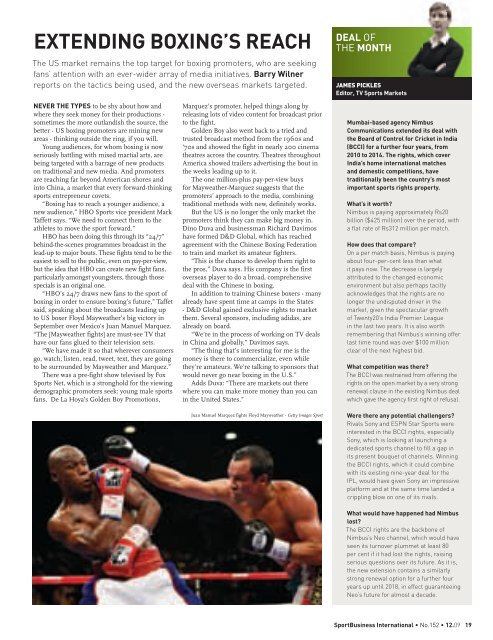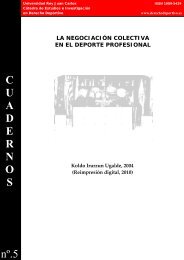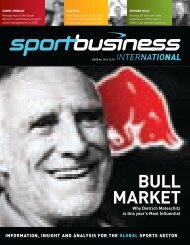01 cover sbi 152.indd - FIFA/CIES International University Network
01 cover sbi 152.indd - FIFA/CIES International University Network
01 cover sbi 152.indd - FIFA/CIES International University Network
Create successful ePaper yourself
Turn your PDF publications into a flip-book with our unique Google optimized e-Paper software.
EXTENDING BOXING’S REACH<br />
The US market remains the top target for boxing promoters, who are seeking<br />
fans’ attention with an ever-wider array of media initiatives. Barry Wilner<br />
reports on the tactics being used, and the new overseas markets targeted.<br />
DEAL OF<br />
THE MONTH<br />
JAMES PICKLES<br />
Editor, TV Sports Markets<br />
NEVER THE TYPES to be shy about how and<br />
where they seek money for their productions -<br />
sometimes the more outlandish the source, the<br />
better - US boxing promoters are mining new<br />
areas - thinking outside the ring, if you will.<br />
Young audiences, for whom boxing is now<br />
seriously battling with mixed martial arts, are<br />
being targeted with a barrage of new products<br />
on traditional and new media. And promoters<br />
are reaching far beyond American shores and<br />
into China, a market that every forward-thinking<br />
sports entrepreneur covets.<br />
“Boxing has to reach a younger audience, a<br />
new audience,” HBO Sports vice president Mark<br />
Taffett says. “We need to connect them to the<br />
athletes to move the sport forward.”<br />
HBO has been doing this through its “24/7”<br />
behind-the-scenes programmes broadcast in the<br />
lead-up to major bouts. These fights tend to be the<br />
easiest to sell to the public, even on pay-per-view,<br />
but the idea that HBO can create new fight fans,<br />
particularly amongst youngsters, through those<br />
specials is an original one.<br />
“HBO’s 24/7 draws new fans to the sport of<br />
boxing in order to ensure boxing’s future,” Taffet<br />
said, speaking about the broadcasts leading up<br />
to US boxer Floyd Mayweather’s big victory in<br />
September over Mexico’s Juan Manuel Marquez.<br />
“The [Mayweather fights] are must-see TV that<br />
have our fans glued to their television sets.<br />
“We have made it so that wherever consumers<br />
go, watch, listen, read, tweet, text, they are going<br />
to be surrounded by Mayweather and Marquez.”<br />
There was a pre-fight show televised by Fox<br />
Sports Net, which is a stronghold for the viewing<br />
demographic promoters seek: young male sports<br />
fans. De La Hoya’s Golden Boy Promotions,<br />
Marquez’s promoter, helped things along by<br />
releasing lots of video content for broadcast prior<br />
to the fight.<br />
Golden Boy also went back to a tried and<br />
trusted broadcast method from the 1960s and<br />
‘70s and showed the fight in nearly 200 cinema<br />
theatres across the country. Theatres throughout<br />
America showed trailers advertising the bout in<br />
the weeks leading up to it.<br />
The one million-plus pay-per-view buys<br />
for Mayweather-Marquez suggests that the<br />
promoters’ approach to the media, combining<br />
traditional methods with new, definitely works.<br />
But the US is no longer the only market the<br />
promoters think they can make big money in.<br />
Dino Duva and businessman Richard Davimos<br />
have formed D&D Global, which has reached<br />
agreement with the Chinese Boxing Federation<br />
to train and market its amateur fighters.<br />
“This is the chance to develop them right to<br />
the pros,” Duva says. His company is the first<br />
overseas player to do a broad, comprehensive<br />
deal with the Chinese in boxing.<br />
In addition to training Chinese boxers - many<br />
already have spent time at camps in the States<br />
- D&D Global gained exclusive rights to market<br />
them. Several sponsors, including adidas, are<br />
already on board.<br />
“We’re in the process of working on TV deals<br />
in China and globally,” Davimos says.<br />
“The thing that’s interesting for me is the<br />
money is there to commercialize, even while<br />
they’re amateurs. We’re talking to sponsors that<br />
would never go near boxing in the U.S.”<br />
Adds Duva: “There are markets out there<br />
where you can make more money than you can<br />
in the United States.”<br />
Juan Manuel Marquez fights Floyd Mayweather - Getty Images Sport<br />
Mumbai-based agency Nimbus<br />
Communications extended its deal with<br />
the Board of Control for Cricket in India<br />
(BCCI) for a further four years, from<br />
2<strong>01</strong>0 to 2<strong>01</strong>4. The rights, which <strong>cover</strong><br />
India’s home international matches<br />
and domestic competitions, have<br />
traditionally been the country’s most<br />
important sports rights property.<br />
What’s it worth<br />
Nimbus is paying approximately Rs20<br />
billion ($425 million) over the period, with<br />
a flat rate of Rs312 million per match.<br />
How does that compare<br />
On a per match basis, Nimbus is paying<br />
about four-per-cent less than what<br />
it pays now. The decrease is largely<br />
attributed to the changed economic<br />
environment but also perhaps tacitly<br />
acknowledges that the rights are no<br />
longer the undisputed driver in the<br />
market, given the spectacular growth<br />
of Twenty20’s India Premier League<br />
in the last two years. It is also worth<br />
remembering that Nimbus’s winning offer<br />
last time round was over $100 million<br />
clear of the next highest bid.<br />
What competition was there<br />
The BCCI was restrained from offering the<br />
rights on the open market by a very strong<br />
renewal clause in the existing Nimbus deal<br />
which gave the agency first right of refusal.<br />
Were there any potential challengers<br />
Rivals Sony and ESPN Star Sports were<br />
interested in the BCCI rights, especially<br />
Sony, which is looking at launching a<br />
dedicated sports channel to fill a gap in<br />
its present bouquet of channels. Winning<br />
the BCCI rights, which it could combine<br />
with its existing nine-year deal for the<br />
IPL, would have given Sony an impressive<br />
platform and at the same time landed a<br />
crippling blow on one of its rivals.<br />
What would have happened had Nimbus<br />
lost<br />
The BCCI rights are the backbone of<br />
Nimbus’s Neo channel, which would have<br />
seen its turnover plummet at least 80<br />
per cent if it had lost the rights, raising<br />
serious questions over its future. As it is,<br />
the new extension contains a similarly<br />
strong renewal option for a further four<br />
years up until 2<strong>01</strong>8, in effect guaranteeing<br />
Neo’s future for almost a decade.<br />
SportBusiness <strong>International</strong> • No.152 • 12.09 19
















